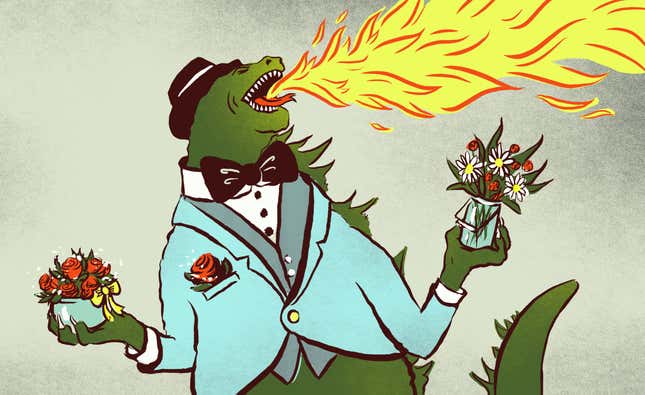Men: Having Opinions About Your Wedding Does Not Make You a Groomzilla
In Depth

A groom is a man who does nothing to help with the wedding besides show up. A “groomzilla,” at least according to a new GQ essay, is apparently a man who has ideas about his wedding at all, or maybe even (gasp) plans it.
Here is what is so great about this piece: as sad as it is that this is a novel perspective, it’s still refreshing to read a hetero guy openly discuss that he had a vision for his own wedding and was happy to take the reins—how it should look, where it would be, who would attend. Zach Baron writes:
What does it mean, in practice, that I’m the bride? We’ve been working that out. Mostly it means I care. I care about table settings, family-style dinner service, centerpieces, the quality and shape of the shuttle bus that will be required to move our drunken friends and family from place to place. I will obsess, like I have obsessed over few things besides certain Future verses, over the guest list and our vows. Until a few months ago, I had no idea any of these things might matter to me. But they do. A lot. I like the decisions, the heightened stakes, the communal nature of it. I like trying to one-up other weddings I’ve been to. I’m competitive. I’m the bride.
Well, no, you’re the groom and you’re handling the wedding planning, but fine. Nonetheless, he offers up an interesting when-a-dude-finally-get-it perspective about being in the wedding planning trenches:
What a weird, passive-aggressive world I’ve found myself at home in. It’s like a video game in which the bosses are all rictus-smiling caterers and maniacally itemizing venue operators and grim, pessimistic florists. You have to triumph over the hordes of people who tell you it’s your special day and they’re just there to give you what you want, followed by the long, disapproving pause when you tell them what you want.
He demonstrates a grasp of the larger, more bizarre, gender-restrictive aspects of the ritual, and is totally sympathetic:
-

-

-

-

-

-

-

-

-

-

-

-

-

-

-

-

-

-

-

-

-

-

-

-

-

-

-

-

-

-

-

-

-

-

-

-

-

-

-

-








































